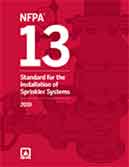 On September 28th this seminar sponsored by the State Fire Marshal Division and Fire Marshals Association of Minnesota for the 2022 Annual Minnesota Fire Marshals Conference will provide a basic understanding of the hazards associated with the operation of marijuana growing and processing facilities. The seminar is targeted towards fire and building inspectors, fire prevention officers and professionals. Discussed will be the latest fire and building codes and regulations. Read more…
On September 28th this seminar sponsored by the State Fire Marshal Division and Fire Marshals Association of Minnesota for the 2022 Annual Minnesota Fire Marshals Conference will provide a basic understanding of the hazards associated with the operation of marijuana growing and processing facilities. The seminar is targeted towards fire and building inspectors, fire prevention officers and professionals. Discussed will be the latest fire and building codes and regulations. Read more…
 NFPA 13 2019 provided a ‘roadmap’ included in the back of the standard for 2019 section cross references for many of the sections found in the 2016 Edition. While this ‘roadmap’ table is useful, it is not a complete reference by any means and as a result, users quite often are left wondering ‘where it all went’. We decided to offer a search engine that simplifies the search process. Read more…
NFPA 13 2019 provided a ‘roadmap’ included in the back of the standard for 2019 section cross references for many of the sections found in the 2016 Edition. While this ‘roadmap’ table is useful, it is not a complete reference by any means and as a result, users quite often are left wondering ‘where it all went’. We decided to offer a search engine that simplifies the search process. Read more…
 On May 13th in Longbeach, CA, this 2-hour seminar sponsored by the SoCAL Fire Prevention Office will provide a basic understanding of the hazards associated with the operation of distillery and marijuana processing facilities. The seminar is targeted towards fire and building inspectors, fire prevention officers and professionals. Discussed will be the latest fire and building codes and regulations. Read more…
On May 13th in Longbeach, CA, this 2-hour seminar sponsored by the SoCAL Fire Prevention Office will provide a basic understanding of the hazards associated with the operation of distillery and marijuana processing facilities. The seminar is targeted towards fire and building inspectors, fire prevention officers and professionals. Discussed will be the latest fire and building codes and regulations. Read more…
 On October 3rd in Northridge, CA, the 2018 Fire Protection Engineering Symposium is sponsored by the Southern California Chapter of the Society of Fire Protection Engineers (SFPE). Invited speakers will present hot topics in the fire protection industry. Also, the newest fire safety technologies will be exhibited. Proceeds benefit the Chapter Scholarship Fund. Come learn about fire protection engineering and support students. Read more…
On October 3rd in Northridge, CA, the 2018 Fire Protection Engineering Symposium is sponsored by the Southern California Chapter of the Society of Fire Protection Engineers (SFPE). Invited speakers will present hot topics in the fire protection industry. Also, the newest fire safety technologies will be exhibited. Proceeds benefit the Chapter Scholarship Fund. Come learn about fire protection engineering and support students. Read more…
 This 4-hour seminar presented on April 4th at the Ben Clark Training Center in Riverside, CA will provide an understanding of the hazardous materials classifications as defined in the Fire and Building Codes and their effect on occupancy classification. The seminar includes workshops designed to help develop a better understanding of the presented materials. Read more…
This 4-hour seminar presented on April 4th at the Ben Clark Training Center in Riverside, CA will provide an understanding of the hazardous materials classifications as defined in the Fire and Building Codes and their effect on occupancy classification. The seminar includes workshops designed to help develop a better understanding of the presented materials. Read more…
 Explore with us in this article the do’s and don’ts of using ESFR sprinkler systems. We discuss common pitfalls in applying these types of sprinkler systems and provide detailed explanations on their correct usage including applicable codes and regulations. Presented are the latest updates on this subject matter based on the 2013 and 2016 editions of NFPA 13, FM Global Property Loss Prevention Data Sheets, and relevant results from the latest fire tests with ESFR sprinkler systems. Read more…
Explore with us in this article the do’s and don’ts of using ESFR sprinkler systems. We discuss common pitfalls in applying these types of sprinkler systems and provide detailed explanations on their correct usage including applicable codes and regulations. Presented are the latest updates on this subject matter based on the 2013 and 2016 editions of NFPA 13, FM Global Property Loss Prevention Data Sheets, and relevant results from the latest fire tests with ESFR sprinkler systems. Read more…
 In recent years, there has been a marked increase in the deployment of various types of battery technologies for use in Energy Storage Systems (ESS). Code enforcing bodies, such as local Authorities Having Jurisdiction (AHJs), are asked to successfully address risks associated with these new battery technologies. However, there is little or no guidance and direction on how to deal with associated hazards, or more specifically, on how to review a successful fire protection approach. Read more…
In recent years, there has been a marked increase in the deployment of various types of battery technologies for use in Energy Storage Systems (ESS). Code enforcing bodies, such as local Authorities Having Jurisdiction (AHJs), are asked to successfully address risks associated with these new battery technologies. However, there is little or no guidance and direction on how to deal with associated hazards, or more specifically, on how to review a successful fire protection approach. Read more…
 Klausbruckner & Associates is announcing a new seminar for November 9th 2016. This seminar will provide a detailed overview of the latest fire and building code provisions associated with flammable and combustible liquids in containers and portable tanks. Discussed will be code changes from the 2013 to the 2016 Edition of the California Fire Code (CFC). Read more…
Klausbruckner & Associates is announcing a new seminar for November 9th 2016. This seminar will provide a detailed overview of the latest fire and building code provisions associated with flammable and combustible liquids in containers and portable tanks. Discussed will be code changes from the 2013 to the 2016 Edition of the California Fire Code (CFC). Read more…
 Fire code professionals, businesses and building owners are facing the dilemma on how to successfully address fire protection issues when working on distilleries and storage of distilled goods. NFPA Standards and Fire Codes provide only some of the answers. Despite a considerable number of fire tests and subsequent advancements in the fire and building codes, there is still a need to creatively resolve many of the remaining unanswered questions. Read more…
Fire code professionals, businesses and building owners are facing the dilemma on how to successfully address fire protection issues when working on distilleries and storage of distilled goods. NFPA Standards and Fire Codes provide only some of the answers. Despite a considerable number of fire tests and subsequent advancements in the fire and building codes, there is still a need to creatively resolve many of the remaining unanswered questions. Read more…
 There is a better in good chance that the Globally Harmonized System (GHS) will impact your business. Current fire and building codes are based on NFPA standards, which – in some cases – differ from GHS regulations. With the start of key implementation deadlines already behind us, businesses must be aware of the differences and key requirements between these two sets of regulations in order to successfully adapt to this change. Read more…
There is a better in good chance that the Globally Harmonized System (GHS) will impact your business. Current fire and building codes are based on NFPA standards, which – in some cases – differ from GHS regulations. With the start of key implementation deadlines already behind us, businesses must be aware of the differences and key requirements between these two sets of regulations in order to successfully adapt to this change. Read more…
 On September 28th this seminar sponsored by the State Fire Marshal Division and Fire Marshals Association of Minnesota for the 2022 Annual Minnesota Fire Marshals Conference will provide a basic understanding of the hazards associated with the operation of marijuana growing and processing facilities. The seminar is targeted towards fire and building inspectors, fire prevention officers and professionals. Discussed will be the latest fire and building codes and regulations. Read more…
On September 28th this seminar sponsored by the State Fire Marshal Division and Fire Marshals Association of Minnesota for the 2022 Annual Minnesota Fire Marshals Conference will provide a basic understanding of the hazards associated with the operation of marijuana growing and processing facilities. The seminar is targeted towards fire and building inspectors, fire prevention officers and professionals. Discussed will be the latest fire and building codes and regulations. Read more…











